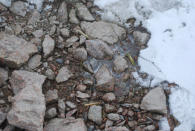Melting snow reveals 800-year-old mummies in Antarctica
 |
An 800-year-old penguin mummy revealed after snow and ice in Antarctica melted. (Steven Emslie) |
Ornithologist Steven Emslie made an unexpected discovery when he stumbled across what appeared to be ancient and fresh remains of Adelie penguins at Cape Irizar, Ross Sea, Antarctica, during a research expedition in 2016.
"In all the years I have been doing this research in Antarctica, I've never seen a site quite like this," Emslie said in a recent press release. He revealed his findings in a paper published late last month.
At the time of discovery, Emslie, an ornithologist at the University of North Carolina, Wilmington, was in Antarctica studying ancient penguin remains as part of a funded research project of the National Science Foundation.
"I went to Cape Irizar after seeing a reference to old penguin guano that was found there," Emslie said in an email to AccuWeather.
 |
Cape Irizar, Ross Sea, Antarctica, Jan. 20, 2016. (Steven Emslie) |
"Since Robert Falcon Scott and Ernest Shackleton had explored the area over a hundred years ago and hadn't written about any penguins at this particular site, I didn't expect to see much since they always wrote about penguins when they saw them," Emslie told The New York Times.
When Emslie arrived at the site, he found white, splotchy guano stains across the surface of the ground and lots of loose chick bones, typically indicating recent use of the site. But that wasn't possible, Emslie said. Upon further investigation, Emslie also discovered complete chick carcasses with feathers falling apart from decay, as well as intact mummies.
Emslie was stunned by the discovery. "I remember thinking, 'Wow, a penguin colony that even Shackleton didn't know about,'" he said to the Times.
"This site must have been covered by snow and ice soon after the colony was last abandoned, preserving the surface remains for centuries until revealed again by recent snowmelt," Emslie explained to AccuWeather.
 |
Bones emerging from the snow on Cape Irizar. (Steven Emslie) |
"This site must have had its beach access opened and closed repeatedly by changing sea ice conditions over time, so that sometimes the coast was open for penguins to colonize this site, then abandoned when access ended and ice remained along the coast during the summer," Emslie said. "Changing conditions could mean less marine food that parents find to feed their chicks." And when the food supply is depleted, he added, "some die or starve."
Carbon dating analysis showed the site was occupied at least three times in the past, beginning about 5,000 years ago. A warming period between 3,000 and 4,000 years ago allowed another occupation, and the last occupation began during the medieval warm period 1,200 years ago and ended at the start of the Little Ice Age 800 years ago.
"That's when I think the site was covered by snow and preserved, with surface remains dating to that last occupation and looking fresh," Emslie added.
 |
An abandoned penguin colony on Cape Irazar. (Steven Emslie) |
Could the site see penguins return in the future?
"Definitely they could return, and perhaps in the not-too-distant future as the current warming trend breaks up the sea ice along the coast earlier each summer. Eventually, it will be early enough to provide the open water beach access penguins need to recolonize this area," Emslie said.
The Ross Sea has warmed by 1.5-2.0 degrees Celsius since the 1980s, according to the Geological Society of America.
Emslie told Business Insider that he would like to return to the Cape Irizar area soon. "There are other caves emerging from under the melting snow nearby that are worth checking to see if they had penguins," he said.
Keep checking back on AccuWeather.com and stay tuned to the AccuWeather Network on DirecTV, Frontier and Verizon Fios.

 money
money 









